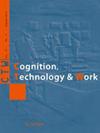An examination of the psychosocial factors impacting workplace accommodation requests in individuals with mental disabilities.
IF 3.4
3区 工程技术
Q2 ENGINEERING, INDUSTRIAL
引用次数: 2
Abstract
BACKGROUND Individuals with mental health issues experience profound stigma and discrimination, which may contribute to a lack of accommodation utilization to address functional limitations of their work. OBJECTIVES This study examined how psychosocial factors may predict the request of accommodations by employed individuals with mental disabilities through the framework of social cognitive career theory. METHODS In the United States, 148 employed adults with mental disabilities completed an online questionnaire to ascertain self-efficacy, outcome expectation, affect, and workplace support. Logistic regression analyses were conducted to examine associations between respondents' psychosocial factors and request of accommodations. RESULTS Psychosocial factors (i.e., self-efficacy in accommodation request, outcome expectancy in employers' compliance with accommodation request, and non-person cost associated with request) were associated with impacting decisions to request accommodations among individuals with mental disabilities. CONCLUSIONS A focus on bolstering self-efficacy and outcome expectation may assist rehabilitation professionals with facilitating positive occupational outcomes for individuals with mental disabilities. Incorporating increased education on the possible implications of mental disabilities in the workplace may also promote successful employment outcomes.对影响精神残疾人士工作场所住宿要求的社会心理因素的调查。
背景:有精神健康问题的个人经历了深刻的耻辱和歧视,这可能导致缺乏利用住宿来解决其工作的功能限制。目的通过社会认知职业理论的框架,探讨心理社会因素如何预测精神残疾就业者的住宿要求。方法在美国,148名患有精神障碍的成年雇员完成了一份在线问卷,以确定自我效能感、结果预期、影响和工作场所支持。进行逻辑回归分析以检验受访者的心理社会因素与住宿要求之间的关系。结果心理社会因素(即住宿请求的自我效能感、雇主遵守住宿请求的结果期望以及与住宿请求相关的非人员成本)与影响精神障碍个体的住宿请求决策相关。结论关注自我效能感和结果期望有助于康复专业人员促进精神障碍患者的积极职业结果。在工作场所增加关于精神残疾可能产生的影响的教育,也可能促进成功的就业结果。
本文章由计算机程序翻译,如有差异,请以英文原文为准。
求助全文
约1分钟内获得全文
求助全文
来源期刊

Cognition Technology & Work
ENGINEERING, INDUSTRIAL-
CiteScore
6.90
自引率
7.70%
发文量
26
审稿时长
>12 weeks
期刊介绍:
Cognition, Technology & Work focuses on the practical issues of human interaction with technology within the context of work and, in particular, how human cognition affects, and is affected by, work and working conditions.
The aim is to publish research that normally resides on the borderline between people, technology, and organisations. Including how people use information technology, how experience and expertise develop through work, and how incidents and accidents are due to the interaction between individual, technical and organisational factors.
The target is thus the study of people at work from a cognitive systems engineering and socio-technical systems perspective.
The most relevant working contexts of interest to CTW are those where the impact of modern technologies on people at work is particularly important for the users involved as well as for the effects on the environment and plants. Modern society has come to depend on the safe and efficient functioning of a multitude of technological systems as diverse as industrial production, transportation, communication, supply of energy, information and materials, health and finance.
 求助内容:
求助内容: 应助结果提醒方式:
应助结果提醒方式:


